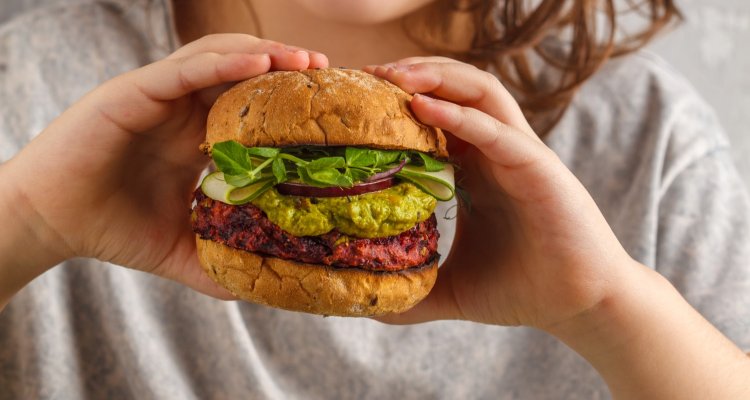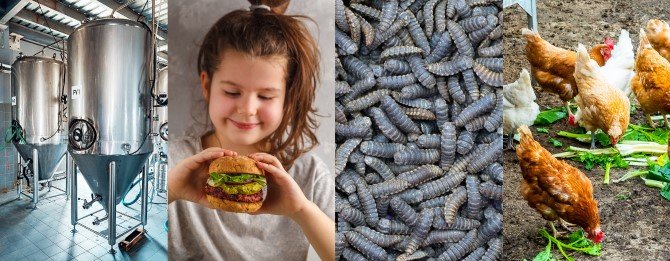
Campaign Protein Transition: from pain points to perspective
How to resolve barriers to the protein transition? An important question for the public and private sector alike. Therefore, in 4 sessions a multidisciplinary team of WUR experts zooms in on 4 major challenges most crucial for policymakers and offers them perspectives. Think of challenges such as reducing dependency on soy import and shaping a circular food system in the future. This is how we move from pain points to perspective!

The 4 major challenges
Innovating traditions: futures for dairy farmers
The future of farmers is one of the biggest challenges facing policymakers. Farmers are stimulated to produce more sustainable and more (different) proteins, but what are the opportunities to do so? Technologies can contribute, but how do farmers see this? And how to stimulate and facilitate this with policy?
Besides producing more protein-rich crops, farmers can play a role in the production of alternative proteins, for example through (precision) fermentation. Especially for dairy farmers, this can be an attractive addition to their “traditional” activities. The technologies for this are in full development with great sustainability benefits: less pressure on livestock as a source of protein and less environmental impact.
But what is precision fermentation? And how does it contribute to sustainability? Food Quality and Design expert at WUR, Etske Bijl shares the latest insights on technology. For example, how to produce milk proteins without cows? Besides that, we need to understand what motivates farmers to adopt such technologies. Zoë Robaey, specialist in technology ethics at WUR, will dive deeper into the challenges that farmers see in this transition. What motivates them to adopt new technologies, like precision fermentation? How does it fit into their picture of the future? And, last but not least, how does this help policy makers in accelerating the protein transition?
Sessions related to this theme
Strategies for a consumption shift: towards a more plant-based diet
Protein consumption and production shifts go hand-in-hand. When influencing consumer behavior, we often focus on the responsibility of individual consumers or on the development of innovative food products, such as meat substitutes. But is that the most impactful way? And how much can policy impact diets? After all, the choices consumers make are "free choices.” What are effective policy instruments in this regard?
According to Emely de Vet, Professor of Consumption and Healthy Lifestyle at WUR, there are more effective ways to influence consumer behavior than current practice. In this session she will reflect on the complexity of this influence process, in order to then move on to high impact policy instruments.
Socioecological models show that the process of influencing behavior is a complex interaction between various factors. At the individual level, consumers are driven by food and taste preferences. At the same time, they are influenced by many factors, from social norms, changing behavior in different social networks, the food environment to policy measures. De Vet provides insight into these factors (at the local and national level) and how important it is to embrace them, as an advance towards effective policy measures.
She concludes with examples of policy interventions, such as encouraging the consumption of pulses, and their effect for the protein transition. She also shares examples of effective policy instruments, based on government experiences. Thereby, the focus is on both sustainability and health effects and the interaction between them, because it is precisely the combination that can accelerate the protein transition.
Sessions related to this theme
Less reliance on soy import: alternatives for animal feed
Worldwide, many countries depend on soy imports, especially for livestock feed and feed for aquaculture. Switching to alternatives is becoming increasingly urgent because large-scale soy cultivation is causing problems such as deforestation, soil depletion and water pollution from pesticides and fertilizers. In this online session, WUR experts give an overview of affordable and sustainable alternatives, and share examples of their application in practice and how to stimulate alternatives from policy perspective.
Sessions about this theme
The future of proteins: scenarios & transition paths
The key question for the coming decades is: what will the food system of the future look like? How do we ensure sufficient, delicious, and nutritious food without depleting resources or damaging ecosystems? Central to these question is: how do we handle protein? After all, the way we produce and consume these essential building blocks is no longer sustainable.
In this online session, WUR experts take policymakers and other interested parties on a journey. Where are we now in the protein transition, what can the food system look like and what barriers need to be solved for this to happen?
Sessions about this theme
The 4 sessions
From November 2022 to February 2023, WUR will organize monthly (online) sessions on one of the 4 challenges. All policy makers, NGOs and others interested in the protein transition worldwide are welcome.
Per session, a team of experts zooms in on the challenge, and especially on perspectives: pathways by which barriers can be solved and protein policy can be designed more effectively.
The online sessions can be watched back and at the end of the series WUR will share a white paper: a summary of the 4 challenges and perspectives, with links to in-depth information. In this way, all interested parties can take full advantage of the knowledge on the protein transition.
Why is WUR organizing these sessions?
Policymakers are increasingly aware of the need for action in the protein transition. Yet the complexity of this challenge which touches on climate change, nitrogen cycles, and loss of biodiversity, makes it difficult to navigate. A consumption shift from animal to plant-based and alternative protein sources is a part of the solution. Rethinking the way animal sourced foods are produced is equally important. Wageningen University & Research has been researching the protein transition for years and believes it is important that this knowledge is widely applied in practice. That is why we are committed to sharing our knowledge with the broad set of stakeholders needed to make the transition happen in practice.